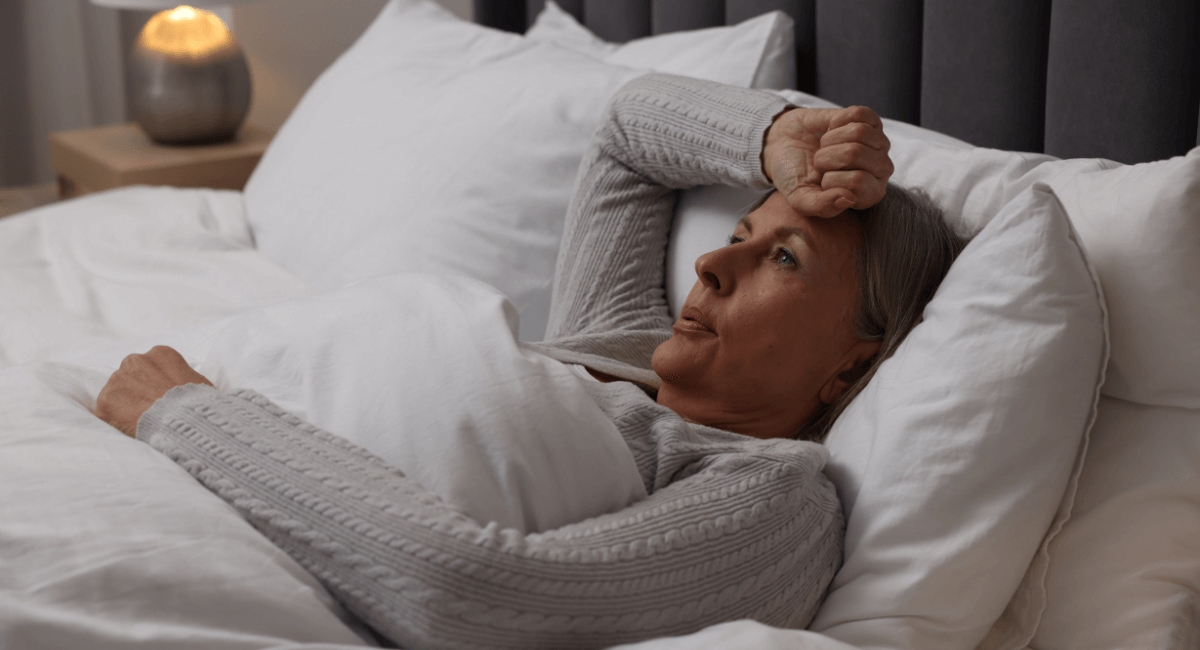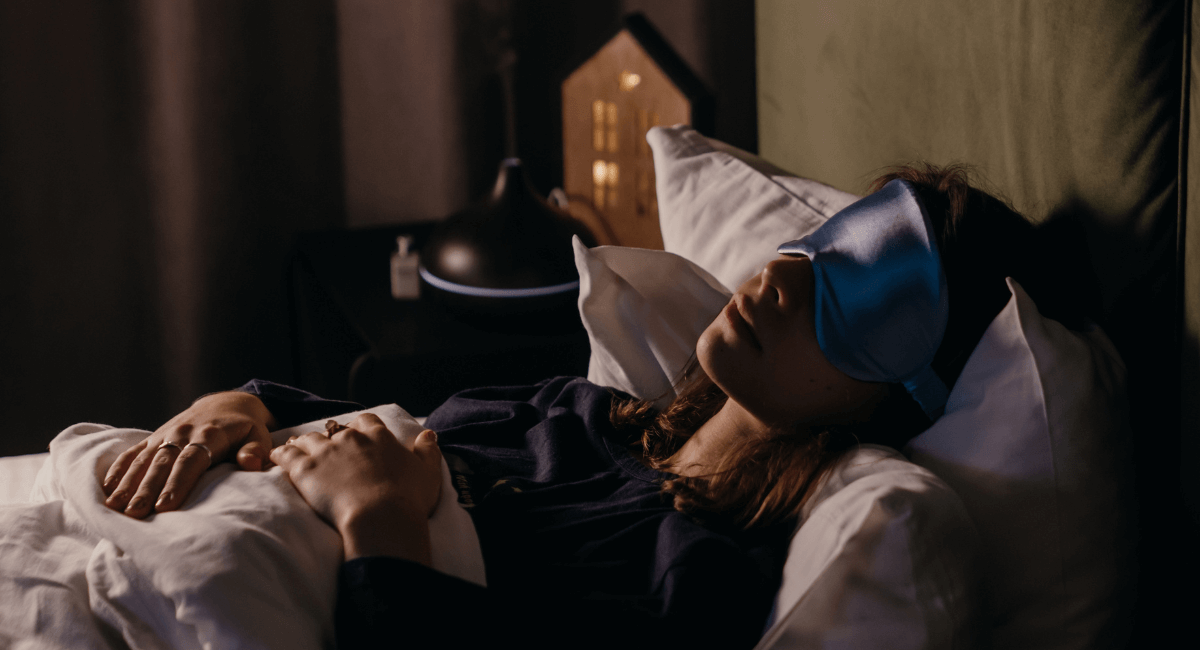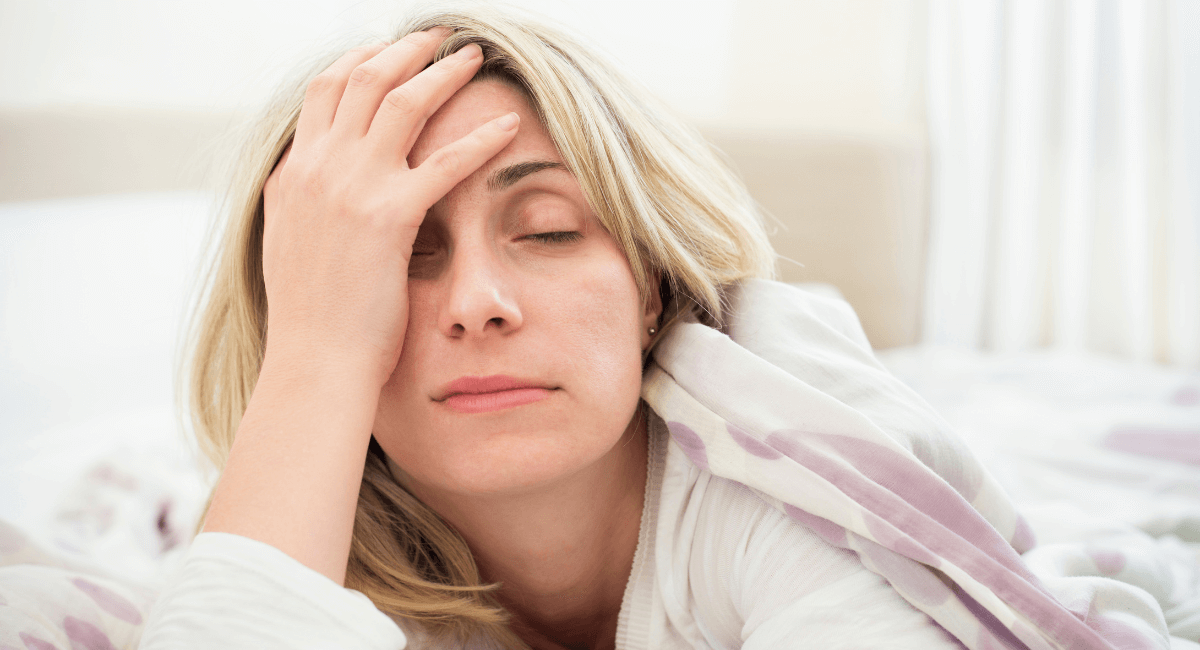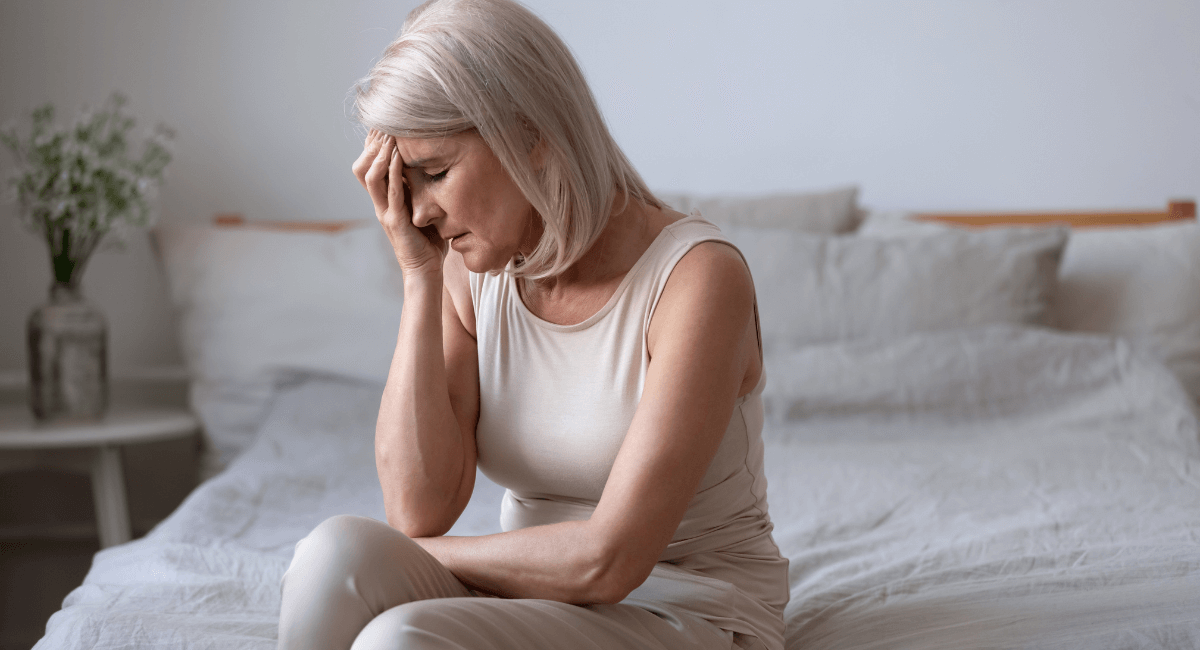Ever find yourself awake at 3 AM, staring at the ceiling, wondering why sleep seems so elusive lately? Or maybe you’re no stranger to waking up drenched in sweat, courtesy of those infamous night sweats? And how about those mornings when you feel more exhausted than when you went to bed? If you’re nodding along, you’re not alone. Many women expect a barrage of symptoms – like hot flashes, a dip in libido, and mood swings – when they hit menopause. But there’s another common side effect that can be sparked by this change of life that many women don’t anticipate – sleep disruptions.
So if the hormonal changes of menopause have turned a peaceful night’s rest into a distant dream, this blog is for you. We’ll explore how menopause impacts sleep, why these hormonal shifts can throw your sleep for a loop, and most importantly – we’ll cover some practical and powerful ways you can reclaim restful nights and wake up feeling refreshed. Let’s start by defining exactly what menopause is.
What Is Menopause?
Menopause is a significant milestone in a woman’s life – marking the end of her menstrual cycles and fertility. It usually happens in your late 40s to early 50s, when your body starts producing less estrogen and progesterone. This change can bring about a variety of experiences, both physical and emotional. Here are some common symptoms you might encounter during menopause:1
- Hot flashes: Sudden feelings of warmth, often accompanied by sweating and a flushed face.
- Night sweats: Episodes of sweating during sleep that can disrupt rest.
- Mood swings: Fluctuations in emotions – sometimes leading to irritability or sadness.
- Vaginal dryness: Decreased lubrication in the vagina, which can lead to discomfort or pain during intercourse.
- Changes in libido: Decreased interest in sexual activity.
- Forgetfulness or difficulty concentrating: Memory lapses or trouble focusing on tasks.
But one of the lesser-known changes that can occur during this major change of life is challenges related to your sleep.
How Does Menopause Affect Sleep?
Sleep is the precious time when our bodies rest and recharge. But unfortunately, menopause can throw a wrench into this vital process – leaving many women tossing and turning through the night. The hormonal changes during menopause (particularly the decline in estrogen and progesterone) can significantly impact your sleep patterns.

Let’s take a closer look at how menopause might be affecting your sleep:
- Night sweats: One of the biggest culprits. These sudden bursts of heat can leave you drenched in sweat and wake you up multiple times a night.
- Insomnia: Falling or staying asleep becomes more challenging, leading to sleepless nights.
- Frequent awakenings: Hormonal fluctuations can cause more fragmented sleep, making it hard to stay asleep.
- Restless legs syndrome: Some women feel an uncomfortable urge to move their legs, which can seriously disrupt sleep.
- Mood changes: Anxiety and mood swings can keep your mind racing when you should be winding down for the night.
So why on earth does menopause have such a dramatic impact on your ability to get some much-needed shut-eye?
Why Does Menopause Impact Sleep So Much?
So, why exactly does menopause seem to wreak such havoc on your sleep? It’s all about the science behind the hormonal shifts happening in your body. During menopause, your levels of estrogen and progesterone – the hormones that regulate many of your body’s functions – start to fluctuate and eventually decline. These changes can have a profound effect on your sleep.
Let’s break down the science behind how this change of life drives those pesky sleep disturbances:4,5
- Hormonal fluctuations: Estrogen and progesterone play a crucial role in regulating sleep. Estrogen helps regulate your body’s temperature and maintains a stable sleep cycle, while progesterone has a calming effect. As these hormone levels drop, you may experience more night sweats, hot flashes, and trouble falling asleep.
- Temperature regulation: Estrogen helps control your body’s thermostat. When estrogen levels drop, your body can become more sensitive to temperature changes – leading to night sweats and hot flashes that disrupt your sleep.
- Mood and anxiety: Lower levels of estrogen and progesterone can affect neurotransmitters in the brain – like serotonin and gamma-aminobutyric acid (GABA) – which help regulate mood and promote relaxation. This can lead to increased anxiety, mood swings, and even depression, all of which can interfere with your ability to get a good night’s sleep.
- Sleep architecture changes: Menopause can alter the structure of your sleep – reducing the amount of deep, restorative sleep you get. This means you might wake up feeling less refreshed and more fatigued, even if you’ve spent the right amount of time in bed.
- Physical symptoms: Beyond night sweats and hot flashes, menopause can bring about other physical changes, such as joint pain and restless legs syndrome, which can make it harder to stay comfortable and asleep through the night.
While you may not be able to stop menopause, the good news is that you don’t have to simply accept restless nights and groggy mornings as your new normal. There are plenty of strategies and tips you can try to improve your sleep quality and wake up feeling more refreshed. Let’s explore some effective ways to get better sleep during menopause.
How To Improve Sleep Impacted By Menopause
Getting a good night’s sleep during menopause might seem challenging, but with the right strategies, you can significantly improve your sleep quality. Here are some effective tips to help you rest better:
- Maintain a cool sleep environment: Keep your bedroom cool and well-ventilated to reduce the likelihood of night sweats. Using a fan, breathable bedding, and moisture-wicking pajamas can also help.
- Establish a bedtime routine: Create a calming pre-sleep routine to signal to your body that it’s time to wind down. This could include activities like reading, taking a warm bath, or practicing relaxation techniques such as deep breathing or meditation.
- Stick to a sleep schedule: Go to bed and wake up at the same time every day – even on weekends. This consistency helps regulate your body’s internal clock and can improve the quality of your sleep.
- Limit screen time before bed: The blue light emitted by phones, tablets, and computers can interfere with your ability to fall asleep. Try to avoid screens at least an hour before bedtime and opt for calming activities instead.
- Watch your diet and caffeine intake: Avoid heavy meals, caffeine, and alcohol close to bedtime, as they can disrupt your sleep. Instead, opt for light snacks if you’re hungry and drink plenty of water throughout the day.
- Stay active: Regular physical activity can promote better sleep. However, try to finish exercising at least a few hours before bedtime to give your body enough time to wind down.
- Manage stress and anxiety: Practices such as yoga, mindfulness, and journaling can help reduce stress and anxiety, making it easier for you to relax and fall asleep.
- Consider natural supplements: Some women find relief with natural sleep aids like melatonin or herbal teas such as chamomile or valerian root. Always consult your healthcare provider before starting any new supplements.

While these shifts can no doubt have a major impact on improving your sleep quality during menopause, there is another option that can maximize your results and help you feel your very best throughout this transition. This option is known as bioidentical hormone replacement therapy.
Bioidentical Hormone Replacement Therapy: A Solution For Managing Menopause and Getting A Better Night’s Sleep?
If lifestyle changes and natural remedies aren’t quite cutting it, bioidentical hormone replacement therapy (BHRT) might be worth considering. BHRT uses hormones that are chemically identical to those your body produces naturally – offering a more tailored approach to managing menopause symptoms.
Here’s how BHRT can help improve your sleep and overall well-being during menopause:
- Restoring hormonal balance: BHRT helps replenish the declining levels of estrogen and progesterone in your body. This can alleviate many menopause symptoms, such as hot flashes and night sweats, which are major culprits behind sleep disturbances.
- Improving sleep quality: By stabilizing hormone levels, BHRT can help regulate your sleep patterns. Many women report falling asleep more easily, staying asleep longer, and waking up feeling more refreshed.
- Enhancing mood and reducing anxiety: Balanced hormone levels can positively affect neurotransmitters in the brain, such as serotonin and GABA, which help regulate mood and promote relaxation. This can lead to reduced anxiety and mood swings – making it easier to wind down and get a good night’s sleep.
- Increasing energy levels: With better sleep and balanced hormones, you may find that your energy levels and overall vitality improve – making it easier to maintain an active lifestyle and cope with daily stresses.
- Personalized treatment: One of the advantages of BHRT is that it can be customized to your individual needs. Your healthcare provider can tailor the therapy to address your specific symptoms and hormone levels – ensuring the most effective treatment.
Many people report that the effects of starting hormone replacement therapy are nothing short of life-changing. Restoring balance to your hormones can be the missing link that gets you feeling like you again.
So, When Is the Right Time To Start Hormone Replacement Therapy For Menopause?
If you’re wondering when to start thinking about hormone replacement therapy, you’re not alone. Many women are told to wait until menopause fully kicks in, but that might not be the best approach. The truth is, some of the symptoms associated with menopause actually begin during perimenopause – the transitional phase leading up to menopause. During perimenopause, you might start experiencing night sweats, mood swings, sleep disturbances, and other symptoms that could benefit from early intervention.
Here at Activated Health & Wellness, we don’t subscribe to the “wait until menopause hits” mentality that you might hear from other doctors. Instead, we believe in being proactive. If you’re already noticing changes in your body and quality of life during perimenopause, it might be time to explore your options – including HRT. Starting treatment early can help manage symptoms more effectively and improve your overall well-being.
It’s also important to note that even if you’ve had a hysterectomy, you may still need hormone support. There’s a common misconception that progesterone isn’t necessary after a hysterectomy, but that’s not necessarily true. Progesterone plays a crucial role in balancing hormones, and it can be a key part of your treatment plan – regardless of whether you’ve had a hysterectomy.
Ultimately, the right time to start HRT is when you begin experiencing symptoms that are affecting your daily life. Whether you’re in the early stages of perimenopause or already navigating menopause, seeking treatment sooner rather than later can help you feel your best.
Supplements To Help You Maximize Your Results With HRT
When it comes to hormone replacement therapy, achieving the best possible results isn’t just about balancing your hormones, – it’s also about ensuring your body is fully supported to optimize that balance. That’s why incorporating the right supplements into your routine can be a game-changer. Here are three supplements that can help you maximize your results with HRT:
- HRT Complete (E): This formula is specifically designed to support hormone metabolism and balance – particularly for those focused on estrogen. It helps create the ideal environment for your hormone therapy to deliver its full physiological impact, enhancing your overall experience.
- HRT Complete (T): Tailored for those focused on testosterone, this supplement works to support proper hormone metabolism, ensuring that your body can fully benefit from hormone therapy and achieve the best possible outcomes from your HRT.
- Diindolylmethane (DIM): DIM is a powerful plant compound that plays a crucial role in healthy estrogen metabolism. It promotes the breakdown of estrogen into its “good” metabolites while reducing the “bad” metabolites that can lead to health issues like weight gain, breast pain, and even cancer. Additionally, DIM helps optimize testosterone performance by freeing up more of it in the body – which can improve energy, mood, and sex drive in both men and women.
These supplements work together to create the foundational metabolic support your body needs to fully benefit from hormone therapy. By incorporating these targeted supplements into your regimen, you can set the stage for your hormone therapy to work its magic, ensuring you get the most out of your treatment.
Ready to Reclaim Your Sleep and Well-Being During Menopause? Hormone Replacement Therapy Specialists in Gilbert, AZ
Navigating menopause can be challenging, but you don’t have to do it alone. At Activated Health & Wellness, we take a holistic Functional Medicine approach to your health. Our highly-trained team will develop a completely personalized plan to restore balance to your hormones. And also identify any other imbalances that might be affecting your well-being.
And while bioidentical hormone replacement therapy is one of our specialties, we know that this life-changing therapy works best with a big-picture, whole-life approach. So we work with you to create a comprehensive lifestyle plan that promotes optimal health and vitality during menopause and beyond!
So if you’re tired of grappling with the unpleasant symptoms of menopause on your own and you’re ready to feel your best, look your best, and live your best life – then don’t waste another minute. Call our clinic today at 480-571-1000 to schedule your consultation and take the first step towards a more balanced and vibrant you!











